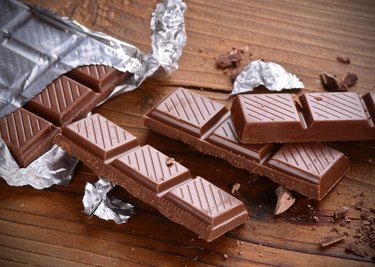
Chocolate can pick you up after a bad day or provide you with a little reward when things are going well — it's a versatile treat. The nutrients in chocolate, including sugar and fat, affect your body as soon as 10 or so minutes after you enjoy a block. However, you might feel a drop in energy after a while as your blood sugar returns to normal.
Types of Chocolate
Video of the Day
The two basic types of chocolate are milk chocolate, which contains ample amounts of sugar that sweeten the taste considerably, and dark chocolate, which generally has little sugar added, contributing to dark chocolate's familiar bitterness.
Video of the Day
Note that white chocolate isn't actually chocolate since it's created using various oils and contains no cocoa, the chief ingredient in both milk and dark chocolate.
Milk Chocolate
Using one serving of a milk chocolate bar from Swiss chocolate maker Lindt as an example, 40 grams of milk chocolate contains approximately 230 calories, 20 grams of sugar, 16 grams of fat and 35 grams of sodium. Other listed nutritional facts are negligible.
Dark Chocolate
Most dark chocolate features less sugar than milk chocolate, so the effect on your blood sugar level is diminished. Comparing Lindt's dark chocolate, you will ingest 230 calories, 18 grams of fat and 5 grams of sugar. The fat content is higher, but less added sugar equals no spike in blood sugar.
Immediate Effects
When eating either type of chocolate, the immediate sensation is one of either sweetness or bitterness. Immediate gratification comes from your brain producing serotonin, the "happy chemical" that leads to psychological feelings of comfort and satisfaction.
After five to 15 minutes, the sugar in milk chocolate — which is a simple carbohydrate — is converted to blood glucose and is available as a quick energy source. Depending on your level of activity over the next hour or so, the rise in blood sugar means a rise in energy levels; however, after this energy expires, you will "crash," meaning your blood glucose level will drop.
Further Effects
You might, after 20 minutes, feel a little energy boost because chocolate contains caffeine. However, the drop in blood sugar, as well as the tryptophan in chocolate, causes feelings of lethargy after eating milk chocolate.
After eating dark chocolate, though, you will generally feel hunger subside, due to dark chocolate's higher fat content; ingested fat causes a quicker sense of satiety, a feeling not generally reported by milk chocolate consumers.
Read more: Types of Healthy Dark Chocolate
- Legion Athletics: This is What Happens to Your Body 1 Hour After Eating Chocolate
- USDA National Nutrient Database: Full Report (All Nutrients): 45144685, LINDT, MILK CHOCOLATE, UPC: 009542026561
- USDA National Nutrient Database: Full Report (All Nutrients): 45041968, LINDT, 85% COCOA EXTRA DARK EXCELLENCE BAR, UPC: 037466016450
Is this an emergency? If you are experiencing serious medical symptoms, please see the National Library of Medicine’s list of signs you need emergency medical attention or call 911.